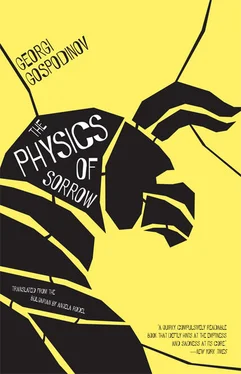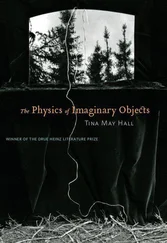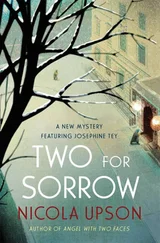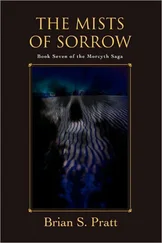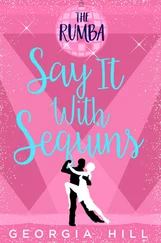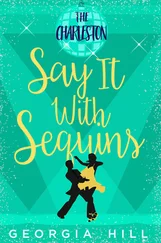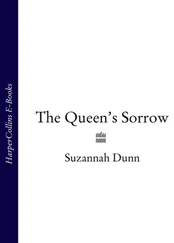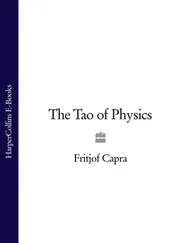Funny that socialism and vegetarianism don’t go together. Like yogurt and fish.
We know that where the neighbor has been, the police are sure to follow. My father was prepared and when they called him down to the precinct, he explained to them in detail how the human anatomy was adapted to a vegetarian diet — a long gastro-intestinal tract, six times longer than the human body, unlike carnivores, whose tracts were only three times longer; flat molars, alkaline saliva and so on. He even quoted Plutarch and his essay “On the Eating of Flesh” to them, where it is said (he had copied this out in his notebook): “But if you will contend that yourself was born to an inclination to such food as you have now a mind to eat, do you then yourself kill what you would eat. But do it yourself, without the help of a chopping-knife, mallet, or axe.”
They let him go.
My father was proud that he had managed to convince them with anatomy and Plutarch. While they had probably decided he wasn’t worth the trouble, figuring he was slightly nuts, but ideologically harmless.
ANTI-ANTHROPOCENTRIC NOTES
During World War II, in the period between 1940 and 1944, in air raids on European museums, seventeen dinosaur skeletons were destroyed. I can clearly picture these double murders, the crushed dead bones, the toppling of these Eiffel Towers of ribs and vertebrae. No animal would do that. To kill someone who had already been dead for millions of years all over again, to reawaken that prehistoric horror in the black box of its skull.
Actually, has anyone ever counted the bodies of animals killed during wartime? Millions of sparrows, ravens, robins, field mice, torn-apart foxes, scorched partridges, rats, the moles’ ruined bomb shelters, the lightly armored turtles crushed by heavily armored tanks — their giant likenesses. No one anywhere has ever made an inventory of such deaths. We’ve never really stopped to think of the suffering we cause to animals during wartime, during air raids. Where do they hide, what happens in the “wild” brains of our “fellow brethren in pain,” as Darwin called them in his notes.
I love natural history, but not its museums. I don’t see anything natural in them. In the end, they are more like mausoleums. What else could we call a place with gutted antelopes, Tibetan yaks, badgers, does, and rhinoceroses? I’ve never experienced pure, unadulterated joy from zoos, either. But everyone is always forced to visit them once, as a child, since parents are convinced that you’re dying to see the elephant listlessly flapping its trunk or the wolf pacing anxiously in its cage, which stinks of carcass.
I’ll never forget the elephant’s heavy sorrow, which almost crushed me (yet another one of my fits), then the melancholy of the black panther stretched out on the dirty cement, or the undisguised tedium with which the tiger met and saw off its guests. On the way out, I recall, I was filled with animalistic sorrow. I can attest that this sorrow is far denser than human sorrow, it’s wild, unfiltered by language, inexpressible and unexpressed, since language nevertheless soothes and calms sorrow, disarms it, bleeds it, just as my grandfather would bleed a sick animal. When they took me to the Museum of Natural History the next day, I had the feeling that the whole zoo had been slaughtered in a single night, stuffed and brought there. I’ve never gone into such tombs since.
NEGLIGENT MURDERS
Whole columns of ants, over all these years, which I’ve stepped on without noticing it. I have big feet, size 12, which increases their destructive power. And my guilt.
MIRIAM, OR ON THE RIGHT TO KILL
We were talking, or actually, I was talking about the need for an anti-Copernican revolution, how important it was — and I mean vitally important — to oust man from the center of the universe, about death, and animals.
“I lived with a Buddhist for three years,” Miriam said, splitting open a large mussel with her long fingers.
I love such beginnings, with no preface, raw, hard.
“It was a long time ago,” she added, heading off my unasked questions. “Know what the most unbearable thing about living with a Buddhist is?” The mussel sank into her mouth, strong white teeth, pearls and the grains of sand between them, seconds until this magnificent meat grinder had made short work of the flesh. “The vow not to kill. That’s the most brutal part. ” Another mussel.
By the end of the second year, the whole house was swarming with cockroaches. Miriam watched the smug hordes creeping by only centimeters away from her. She had no right to lay a finger on them. She was in love and thus magnanimous. She held out for a whole year. In the evening, she would slip into her sleeping bag and pull the zipper up over her head, leaving only a small hole for air. One night she woke up and saw two cockroaches nestled in the beard of her Buddhist-lover who was sleeping soundly beside her. That was too much. The next day, while the Buddhist was at work (I was amazed that Buddhists work), she bought the strongest spray against such varmints and fumigated the whole apartment herself. It was true mass murder. Genocide! Miriam imitated the infuriated Buddhist, who had come back that evening, stood in the middle of the room, looking around at the dead cockroaches, their stiff little legs turned up toward the ceiling, he had stood there like the last survivor amid an apocalypse.
“Have you ever seen a Buddhist scream?” Miriam asked. “It’s worth seeing. He screamed that I had shattered the whole chain of life, that the world would never be the same, that the karmic. He slammed the door and left. Actually, he already had a mistress.”
For several minutes, the only sound was the cracking of shells and the cold rain outside. I was thinking about that last line and an inexplicable rage was building up inside me against that working Buddhist with his mistress, that shepherd of cockroaches.
“Anyway, the right to kill is inviolable,” Miriam said slowly. Then she carefully placed the last mussel shell on the rocky mountains in front of her.
I will put Miriam’s story in the green box, too, for balance. So we have one of every kind.
THROUGH A LAMB’S EAR
Man needs to shut up for a while and in the ensuing pause to hear the voice of some other storyteller — a fish, dragonfly, weasel, or bamboo, cat, orchid, or pebble. How do we know, for instance, that bees don’t write novels? Have we deciphered even a single honeycomb? Or should we start with fish? What a huge part of evolution remains locked up in the fish’s silence, what knowledge have fish accumulated over all those millennia before us! The deep, cold storehouses of that silence. Untouched by language. Because language channels and drains deposits of knowledge like a drill.
And so, the only storytelling creature, man, shuts up and steps back, yielding the floor to the organic and inorganic ones that have stored up silences until now. Actually, they’ve been telling their tales, but their muted, suppressed narrative has turned into mica and lichen, seaweed, moss, honey, the tearing apart of other’s bodies and the torn-apartness of their own.
I have no idea how to make this happen. Maybe we just need to take the first step. All the world’s classics, retold by animals for animals.
For example, we could retell The Old Man and the Sea through the eyes of the fish, that marlin. Now that’s what I call anti-anthropocentrism. Its battle with the gaunt old man and the sea is no less dramatic. When it comes down to it, the fish is the character locked in a life-and-death struggle throughout the whole story. The old man’s story is a story about the battle against aging. While the fish’s is a story about death. The whole story through the voice of a fish, bleeding, gnawed clean to the bone, yet resisting to the very last.
Читать дальше
